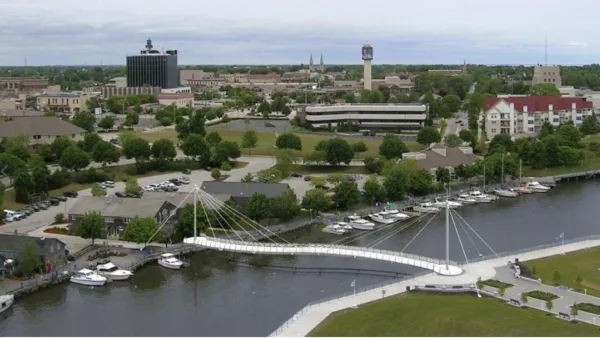Transportation Secretary Pete Buttigieg set off a social media frenzy by referencing an anecdote from "The Power Broker." While some didn't understand the reference, others repeated long-standing questions about the source.

By now you've probably seen the clip of Transportation Secretary Pete Buttigieg (in a video posted by the Twitter account of The Hill) referencing one of the most famous anecdotes from Robert Caro's The Power Broker as evidence of the racist intentions of planning and design decisions—a theme that Buttigieg has already spoken on repeatedly during his first year in the position. Here's the text of what Buttigieg said during a press conference about the new transportation funding available in the recently approved Infrastructure Investment and Jobs Act:
I’m still surprised that some people were surprised when I pointed to the fact that if a highway was built for the purpose of dividing a White and a Black neighborhood, or if an underpass was constructed such that a bus carrying mostly Black and Puerto Rican kids to a beach — or it would have been — in New York, was designed too low for it to pass by, that that obviously reflects racism that went into those design choices. I don’t think we have anything to lose by confronting that simple reality.”
Secretary Buttiegieg is, of course, referring to an anecdote in The Power Broker that tells a story about Robert Moses instructing project managers to lower bridge clearances on the Southern State Parkway near Jones Beach State Park to block the access of buses—potentially carrying the Black and Puerto Rican children mentioned by Buttigieg.
The pushback from the right side of the political aisle was swift, with Republicans such as Florida Gov. Ron DeSantis, Senator Ted Cruz (R-Texas), and hosts of the Fox News show "The Five" taking aim at the transportation secretary.
Many who have studied The Power Broker and know the history of racism in the planning programs of not just Robert Moses in New York, but all over the country, rushed to clarify the record. Philip Bump wrote for The Washington Post that the entire episode proved the need for a national discussion about institutionalized racism. Ellen McGirt wrote for Fortune [paywall] that Buttigieg understands the assignment of addressing racial inequity. Ahmed Baba wrote for Yahoo News that Buttigieg is right, and Senator Cruz and Tucker Carlson are wrong.
As noted in an article by Washington Post fact checker Glenn Kessler, however, many believe the anecdote from The Power Broker to be apocryphal. The footnotes from the book list the source for the anecdote as just one person, Sidney M. Shapiro, whom Kessler describes as a "close Moses associate and former chief engineer and general manager of the Long Island State Park Commission." The lack of double verification or written verification of Moses's instruction regarding the bridge have long contributed to a debate about the veracity of the claim. Kessler details the researchers who have attempted to verify the anecdote, finding reputable sources on either side of the issue.
To argue that the anecdote is apocryphal, Kessler cites Bernward Joerges, a German professor of sociology who examined the saga of the bridges in 1999. "In an essay, he acknowledged Moses was an 'undemocratic scoundrel' and a 'structural racist' but argues that all parkways at the time had low bridges," writes Kessler.
To argue that the anecdote is factual, Kessler cites the work of Thomas J. Campanella, a Cornell University historian of city planning and author the 2019 book Brooklyn: The Once and Future City. According to Kessler, Campanella "recorded clearances for 20 bridges, viaducts and overpasses on other parkways built at the time and compared them to measures of the 20 original bridges and overpasses on the Southern State Parkway. It turned out clearances are substantially lower on the Moses parkway."
While the veracity of this particular anecdote is subject to debate, the question of whether roads and highways have been designed with racist intentions is well established. Kessler seems to be implying that the existence of structural racism deserves more careful attention by those in positions of power, like Buttigieg: "Buttigieg should tailor his remarks to reflect what is historically unimpeachable — and we should be more careful to double-check on the latest views of historians. Even a Pulitzer Prize-winning book is not always the last word on a subject."
FULL STORY: Robert Moses and the saga of the racist parkway bridges

Planetizen Federal Action Tracker
A weekly monitor of how Trump’s orders and actions are impacting planners and planning in America.

Chicago’s Ghost Rails
Just beneath the surface of the modern city lie the remnants of its expansive early 20th-century streetcar system.

Amtrak Cutting Jobs, Funding to High-Speed Rail
The agency plans to cut 10 percent of its workforce and has confirmed it will not fund new high-speed rail projects.

Ohio Forces Data Centers to Prepay for Power
Utilities are calling on states to hold data center operators responsible for new energy demands to prevent leaving consumers on the hook for their bills.

MARTA CEO Steps Down Amid Citizenship Concerns
MARTA’s board announced Thursday that its chief, who is from Canada, is resigning due to questions about his immigration status.

Silicon Valley ‘Bike Superhighway’ Awarded $14M State Grant
A Caltrans grant brings the 10-mile Central Bikeway project connecting Santa Clara and East San Jose closer to fruition.
Urban Design for Planners 1: Software Tools
This six-course series explores essential urban design concepts using open source software and equips planners with the tools they need to participate fully in the urban design process.
Planning for Universal Design
Learn the tools for implementing Universal Design in planning regulations.
Caltrans
City of Fort Worth
Mpact (founded as Rail~Volution)
City of Camden Redevelopment Agency
City of Astoria
City of Portland
City of Laramie




























